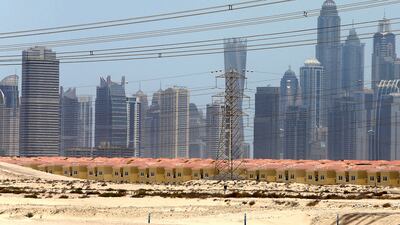The cost of housing is back on the agenda in Dubai, as an increasing number of statistics point towards rapidly rising sale prices and rents. As the emirate gears up for one of the largest Cityscape exhibitions in years, the rapidly rising cost of renting and owning property in Dubai, particularly in the residential sector, is leading many commentators to question whether another bubble is developing.
Jones Lang LaSalle reported last week that house prices in the emirate rose by an average of 17.9 per cent over the year to the end of August, while it estimates that population and employment growth increased by just 5 per cent over the same period. Jones Lang described such growth as unsustainable, and warned that there could be a correction within the next 12 months.
A survey carried out by Knight Frank in the first quarter of 2013 found that Dubai’s prime rental market was the fastest growing in the world, with a year on year growth of 18.3 per cent, compared with 1.9 per cent in Singapore, and falls of 2.3 and 3.1 per cent for Hong Kong and London.
However, a survey published last month by the international property adviser Savills offers an alternative viewpoint, which may offer more comforting news for Dubai as it continues to seek to attract foreign businesses to its shores.
Savills’ “value for money” ranking, part of its World Cities Report, surveyed 10 leading business centres, measuring accommodation costs against GDP per head, as an indicator income potential for businesses located in the city.
Using this formula, Singapore was deemed to be the best value for money city of the 10 centres surveyed, despite its comparatively high commercial and residential rents, followed by Sydney, Moscow and New York. Mumbai, where costs were just over half of those of Singapore, came in last in the survey in terms of value for money.
“The value of real estate is higher where more corporate revenue can be generated,” said Yolande Barnes, director of residential research at Savills. “In other words, it is worth paying more to accommodate an executive team in Singapore with its high GDP than in the low GDP Mumbai.”
Using such criteria, Dubai and the UAE continue to rank as attractive options for international businesses, thanks to the country’s relatively small but growing population, and an economy showing strong signs of growth. The UAE’s economy is forecast to grow by 3.95 per cent this year, according to a composite of economic forecasts compiled by Bloomberg, comparing favourably with markets such as Singapore (2.6 per cent) and Hong Kong (3 per cent).
At the emirate level, Dubai’s GDP is forecast to grow by 3.9 per cent during 2013, according to Emirates NBD.
And the UAE ranked 26th in the World Bank’s Doing Business report for 2012, second only to Saudi Arabia, topping the Middle East for starting a business, getting electricity, registering a property and trading across borders.
While such factors mean the outlook for Dubai and the UAE remains positive, challenges remain for businesses and employees, with large commercial and residential rental increases in the past 12 months.
On the one hand, businesses looking to set up or expand in Dubai can still take advantage of commercial rents far below those reached at the tail end of the emirate’s boom years. A report last week from the property broker Asteco found that commercial rents are still on average 66 per cent below the peak rates paid in September 2008.
However office rents are on the up again, with office space in growth districts such as Jumeirah Lakes Towers and Tecom C up 110 per cent and 82 per cent year on year. Average commercial rents across Dubai grew 43 per cent during the year, according to Asteco.
Of greater concern perhaps is the continuing rise in residential rents across the city. Rental rates for apartments and villas in Dubai were up 23 and 19 per cent year on year respectively, Asteco’s report found, with rents rising fastest in areas such as International City, JLT, the Springs and Mirdif. While rental rates for both apartments and villas rents are still below the heights of 2008’s third quarter, the gap has narrowed to 38 and 31 per cent respectively.
Dubai’s commercial and residential rental rates are widely forecast to keep on rising, with prices pushed up by Dubai’s continuing economic recovery.
The emirate’s economic recovery, however, will not result in salary increases in line with the increases in rents, according to research published by Hay Group last month.
In the midst of Dubai’s recovery, companies are hiring like never before, according to Hay Group. Of the 270,000 employees surveyed for the consultancy’s UAE Compensation and Benefits Report, 44,000 had begun work for a new company in the past 12 months, as compared with 34,000 last year.
Yet the company found that a sizeable number of new arrivals in Dubai come from western countries with stagnant economies, with lower salary expectations than expatriates from growth economies in Asia.
As a result, salaries grew on average by 4.4 per cent in 2013, compared with 4.9 per cent in 2012. Although salaries are forecast to increase by an average of 5 per cent next year, increasing inflationary pressures in areas such as health care and education are likely to limit any growth in disposable income.
jeverington@thenational.ae

